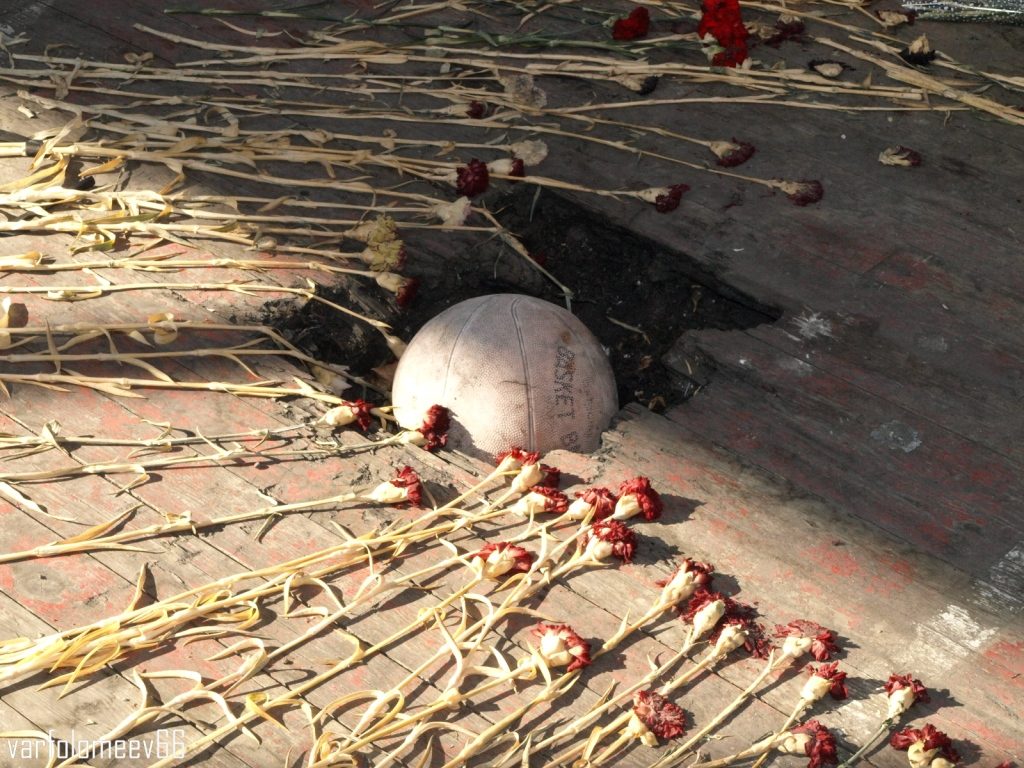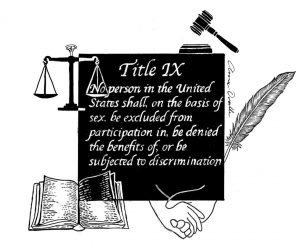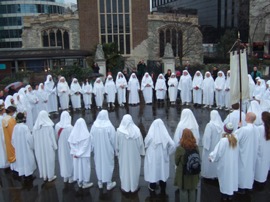For students all around Russia, September 1 traditionally marks the end of a fun-filled summer and the start of a new school year. On this day, their families and educators join them to celebrate what is known in Russia as the “Day of Knowledge.” For many schools, the year 2004 would be no different. Students would pick out flowers for their teachers and parents would prepare their children for the ceremony.1 This wouldn’t be the case for the Beslan School Number One, however. Their festivities would be interrupted by an evil force that would change the Beslan community forever.
Students ranging from the ages of seven to eighteen, along with teachers and staff, filled their school building. Parents and families were also present, anticipating the celebration of the national holiday. At 9:30 am, just before they were about to begin, around 32 armed terrorists entered the school and forced over 1,000 people into the school’s gymnasium. The terrorists wore camouflage uniforms and ski masks. Two of them were women, and many of them had explosives attached to their belts.2
Earlier that morning, in a forest northeast of Beslan, the group began preparing for the terror they were about to bring to the Beslan community. Led by Ruslan Khuchbarov, the Chechen and Ingush members took the less-populated roads to Beslan. They were pulled over by a policeman on the way, whom they held at gunpoint and overtook his vehicle, holding him hostage in the back seat. Once they arrived at the school, the policeman took off and ran to the police station, while the terrorists began to fire their weapons in the air.3
The motives behind the attack stem from a historically troubled relationship between Russia and Chechnya. In the early nineteenth century, Russia forcibly annexed the Chechen ethnic group into the Russian empire, but they resisted Russian rule for over a century. In 1917, Chechnya declared its independence, but was put down in 1920 by the Red Army. Once the Soviet Union collapsed in 1991, Chechnya was led by Dzhokar Dudayev, a former Soviet bomber pilot that declared independence for Chechnya from the Russian Federation. Russia refused, once again, to accept Chechnya’s independence and started two Chechnya wars that would happen in the next decade. Although Russia put an end to Dudayev’s rule, the capital city of Grozny and its people fell victim to the warfare. In the now pro-Russian government Chechnya, Chechen rebels emerged in 1996 and have been carrying out terrorist attacks ever since. Russia’s response to those attacks have included heavy military antics, resulting in even more civilian casualties.4
The conditions for the people in the gymnasium were unbearable. It was overcrowded, the people were denied food and water, and they weren’t allowed to use the facilities. Two fathers had been executed in front of the rest of the hostages and their children for disobeying the terrorists’ orders. To make matters even worse, the terrorists placed explosives on the gym walls and in bottles hanging over the children’s heads. They had even set up an explosive known as “Dead Man’s Switch,” that would be detonated if one the terrorist standing on it stepped off. There was no end in sight for the hostages at this point, the terrorists made sure of that. They strengthened their position by placing trip wires around the building to prevent rescue operations.5

Outside of the school local police, army troops, and worried families gathered, watching the terrorists’ every move. They were unsure of what actions to take considering the strength of the terrorists’ position and the lack of direction from the Russian government. In the year before, on October 24, 2002, 53 Chechen rebels had seized the Moscow Dubrovka Theatre, holding 979 hostages. Russia’s military response was to release a gas that would make the terrorists unconscious along with the hostages, making it a more feasible rescue. However, 128 of those hostages died during the rescue. The Russian government received a lot of criticism for their heavy military tactic in response to the crisis.6 Consequently, this would result in an even greater hesitation to take action against the terrorists inside the Beslan School.
The terrorists requested Ruslan Aushev, the former president of neighboring Ingushetia, to be the negotiator between the two sides. Aushev also had a role in the negotiations during the Moscow Hostage Crisis in 2002. However, he was not successful in the negotiations, although the terrorists did agree to release 26 mothers and infants. Some of the mothers refused to leave their older children behind in the gym and stayed with them. In the third and last day of the siege, around 1:00 in the afternoon, a medical team approached the school to remove the bodies of those that had been killed so far, as permitted by the terrorist group. As the team began to reach the building, the terrorists began to fire at them, killing two medical workers. An explosive was then detonated, causing parts of the gym’s ceiling to collapse. Hostages began to make a run for it, getting caught in the crossfire between the terrorists and the Russian special forces, army troops, armed civilians and police on the other side of the school yard. A tank and helicopter gunships were also present in the assault, which lasted for about two hours. During these two hours, more bombs went off, leaving the school building in flames, and terrorists attempted to escape as the Russian forces took over the school. At the end of the assault, 344 civilians had died, at least 172 of them were children. Some were missing or unidentifiable due to being consumed by fire. Only one terrorist was left alive.7

Once again, the Russian government received criticism for its response to this terrorist attack–starting with the lack of protection in schools in this region after being tipped off about a preemptive attack before the siege, to the lack of medical teams on the scene, leaving civilians responsible for driving the victims to the unequipped local hospital. Another criticism involved the authority’s dictation over the media coverage of the siege. Only the Russian authority’s and officials’ perspectives were reported during the crisis, making it seem as if the Russian government was being “resourceful and effective” when responding to the crisis. However, the few eyewitness reports that exist say otherwise.8 Not only did this alter the narrative surrounding the crisis, but at the beginning of the siege, terrorists were outraged by the authority’s control of the media coverage. The portrayal of the crisis was construed to look as if the Russian government had everything under control, when in reality and unfortunately, the terrorists had a greater force and control of the negotiations and hostages. This prompted them to throw the bodies of the executed men out of the window.9 Another failure that was also pointed out on behalf of the Russian government’s handling of the crisis was that investigators failed to examine the evidence left on the site before allowing bulldozers and other heavy machines to take the remaining debris.10

Although the Russian Parliamentary commission exonerated Russian security forces by placing the blame for the high death toll solely on the Chechen terrorists, the issue of Russia’s response to both the Beslan and Moscow Theatre Crisis remains in conversations today.11 Russia has since implemented some changes after the occurrence of these attacks. Following the Beslan attack, they reinstated the death penalty for terrorism. However, this measure hasn’t completely stopped terrorist attacks from Chechen and Ingush insurgents. Furthermore, in 2013, threats from Islamist militants grew as they began funding and aiding Chechen separatists.12
For weeks following the Beslan School Number One siege, several memorials and burials took place. Families mourned their loved ones. Teachers mourned their students. While the rest of the world continues to celebrate Day of Knowledge each year, Beslan remembers the great loss of innocence in its community during those three days that began with the interruption of their celebration.
- Olga Gorshkova, “Russia celebrates ‘Day of Knowledge’,” Russia Beyond (website), May 9, 2019, https://www.rbth.com/articles/2012/08/01/russia_celebrates_day_of_knowledge_holiday_17823.html. ↵
- Sergey Ponomarev, and NTV-Russian Television Channel, Beslan School Massacre, 2006 (Terrorism: Essential Primary Sources), 175-78. ↵
- Timothy Phillips, Beslan: The Tragedy of School No. 1 (Great Britain: Granta Books, 2014), 18-23. ↵
- Society for Russian-Chechen Friendship, Russia-Chechnya Conflict, 2006 (Terrorism: Essential Primary Sources), edited by K. Lee Lerner and Brenda Wilmoth Lerner, 169-72. ↵
- Sergey Ponomarev, and NTV-Russian Television Channel, Beslan School Massacre, 2006 (Terrorism: Essential Primary Sources), 176. ↵
- Aglaya Snetkov, “The Image of the Terrorist Threat in the Official Russian Press: The Moscow Theatre Crisis (2002) and the Beslan Hostage Crisis (2004),” Europe-Asia Studies 59, no 8 (2007): 1352. ↵
- Sergey Ponomarev, and NTV-Russian Television Channel, Beslan School Massacre, 2006 (Terrorism: Essential Primary Sources), 176. ↵
- Sue-Ann Harding, “Translation and the Circulation of Competing Narratives from the Wars in Chechnya: A Case Study from the 2004 Beslan Hostage Disaster,” Les Presses de l’Université de Montréal, (March 2011): 46-47. ↵
- European Court of Human Rights, Case of Tagayeva and Others v. Russia, April 13, 2017: 14. ↵
- European Court of Human Rights, Case of Tagayeva and Others v. Russia, April 13, 2017: 17. ↵
- C.J. Chivers, “Russian Excuses Itself in Final Report on Beslan,” The New York Times, 2006. ↵
- Joshua Sinai, “Terrorist Threats Against Russia and Its Counterterrorism Response Measure,” Connections 14, no. 4 (2015): 97-98. ↵



26 comments
Rosa Robledo Martinez
It’s very upsetting that many people were killed in this terrorist attack, this article was well-written and it contains a very important message in our society. I feel as years pass not, there is always a lot of hate around us. I enjoyed reading this article because it allow us to learn about what happened in Russia. I still can’t get over the death of the innocent children.
Audrey Uribe
It’s crazy to think of how some proactive moves on Russia’s end could have prevented tragedies. So many people innocent civilians were victims to such an evil crime. Having children be the target and resulting in casualties and hostages is just unacceptable. The government was definitely not innocent in this act but I was glad to read they tried to help but it could have been prevented.
Nicole Ortiz
It’s terrifying to see and read about all of these massacres that have occurred in current and past history especially when they take place in schools. It makes me sad because school should be a place where one goes to further their education and make something out of oneself, not a place where one goes and fears whether or not they’ll live to go back home to their families or have to know things to protect themselves in those kinds of situations. It’s so messed up how leaders and people with power would rather enforce things like bulletproof backpacks, what to do in a school shooting training, and many other things rather than address the REAL issue at hand and put a stop to gun usage or enforce a stricter gun policy. But sadly, that’s how the world is now and its terrifying always being paranoid or worried about what I would have to do if a shooting occurred wherever I’m at.
Charli Delmonico
I can’t believe that so many people were killed in this terrorist attack. This is a very important topic today, especially since the Russian government should feel the need to come up with more effective rescue operations when terrible, unexpected events like this occur. In the future, I hope the Russian government fixes their media’s perspective as well and tell the story how the story happened exactly.
Mitchell Yocham
It is horrifying to hear about these kinds of events because those kids were so innocent. They come from an amazing summer and then the worst thing that could have happened to them happened to them. I wish that we could just look into the brains of people like this and just understand why they need to resort to this.
Olivia Tijerina
I feel like the article had an important message to discuss because it was able to show to the reader that the incidents that happened in Russia, but there is no intention to have a particular task for a country should such messages belong in another country, is important to take interest in/ pay attention to because it helps us become more aware of what outside forces are capable of if there is no precautions.
Alin Bocardo Felix
Terrorism is a form of cowardice power, and this terrible act that took place during a school event proves so. Nearly 400 people suffered the consequences of events in which they had no part of, and it only created new problems for the future generation and supporters of such things. The article is very inclusive of details, starting from the historical aspect of it, to what took place and details within, and the effects of it all. The families disoriented from the attack were victims of the terrible governing of the country, but I still don’t believe it should just fall on the Russian government, since they were trying to help.
Steven Clinton
Great article! This history of Chechnya and Russia was something I wasn’t never aware of. Chechnya severely wanted there independence from the Russian government, after Russia forcefully annex them into there nation. The people of Chechnya are understandably upset that culture and resources were being siphon away from them by there Russian oppressors.
Jose Chaman
This story shows how savages and heartless humans can be. I had to read this article twice because it was so impacting that I still do not believe this could happen, really sickening. Nobody from that school deserved to pass through all that martyrdom. The Russian government also demonstrated a lack of planning, the authorities failed their community by not establishing any guidelines for emergencies like these. How could they shoot while the civilians where there!? This was a completely nightmarish experience, and experiences like these are still happening all around the world. Great article.
Jacqueline Mendez
This is such a tragic and sad event that happened. I have never heard of such an awful event. Russias military clearly was at most fault to this. You do not shoot when civilians are present! Not in the way they did. I wished the terrorist motifs were revealed in this article. But no matter what motif or objective people should never die the way these people died. Kids died this day they never got the chance to live their life for this senseless act.